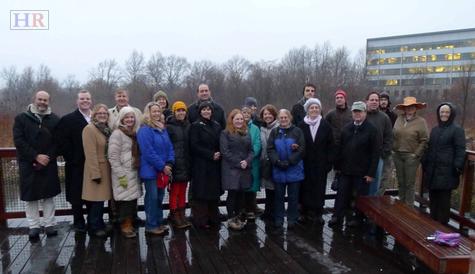Dykema and Colleagues Tour Constructed Wetland at Alewife Reservation

Green infrastructure increasingly provides opportunities to find creative solutions for water management. Monday Representative Carolyn Dykema and Senator Jamie Eldridge joined their colleagues in the legislature from across the Commonwealth for a tour of the Constructed Wetland in the City of Cambridge at the MA Department of Conservation and Recreation (DCR) Alewife Reservation to see one of the largest green infrastructure projects in the US.
“More and more often, natural processes like constructed wetlands are being used to complement traditional pipe infrastructure, providing lower costs and better benefits to the environment and the public,” said Representative Dykema. “In the legislature, we need to create more incentives and opportunities for communities to choose green infrastructure like the remarkable project here at Alewife. It’s my hope that someday projects like this will become the standard, rather than the exception.”
Coordinated by the Nature Conservancy and Bioengineering Group, almost 30 attendees, including state legislators, scientists, landscape architects, engineers, state environmental agencies and conservation organizations braved 40 degree temperatures, rain and ice for the tour.
“The Nature Conservancy applauds the leadership of Representative Dykema and Senator Eldridge that included green infrastructure funding and support as options for communities in the water infrastructure legislation. Green infrastructure has broad-based support from members of the Water Infrastructure Financing Commission.” Steve Long, Director of Government Relations of the Nature Conservancy in Massachusetts.
The rainy day gave an opportunity to see the green infrastructure in action as waters flowed into the different wetland treatment zones according to the carefully designed engineering that is addressing climate change impacts, providing clean water, reducing flood risks and saving funds on operations and maintenance.
“Green infrastructure uses natural processes, fueled by the sun’s energy, to cleanse, store, and release water to enhance land and river habitats. Unlike purely “gray” solutions, the Alewife project offers the best of both types, demonstrating an effective and attractive option for urban settings. Best of all, it stores away carbon to reduce climate change,” Wendi Goldsmith, lead scientist and CEO Bioengineering Group
The Alewife project highlights the potential benefits that green infrastructure can provide to communities:
Municipal cost savings and cost avoidance. The green infrastructure for this project cost half of traditionally proposed grey infrastructure of pipes and concrete and also exponentially reduces the operations and maintenance costs to the City of Cambridge and the DCR to maintain operations.
Improved water quality and enhanced protection of nature. The project layout and vegetation illustrates the synergistic relationships with existing ecological patterns and processes that provide a significant improvement over existing degraded habitat and enhances the health of adjacent natural wetlands.
Public safety. Chronic local flooding is addressed by rerouting runoff into this engineered basin where stormwater is separated, stored, treated and released with specific flow patterns that to address the problem Unlike standard storm drain catch basins which breed mosquitoes, the treatment wetland is designed to host mosquito eaters, as testing documents.
Public recreation. Incorporates public spaces and trails that provide benefits to the community at large.
For more information about the project, see Bioengineering Group’s website: http://www.bioengineering.com/projects/view.php?id=42
Carolyn Dykema's foresight in exploring water problems & solutions will help us maintain/improve our area's quality of life and ultimately contain the enormous costs we are beginning to see looming. Holliston's water management is already an actual physical concern in many users' taps, a growing problem in our landscapes, and a controversial topic for discussion. We are fortunate to have a representative who is developing expertise, network and leadership in this area.
Susan | 2013-12-22 06:33:57